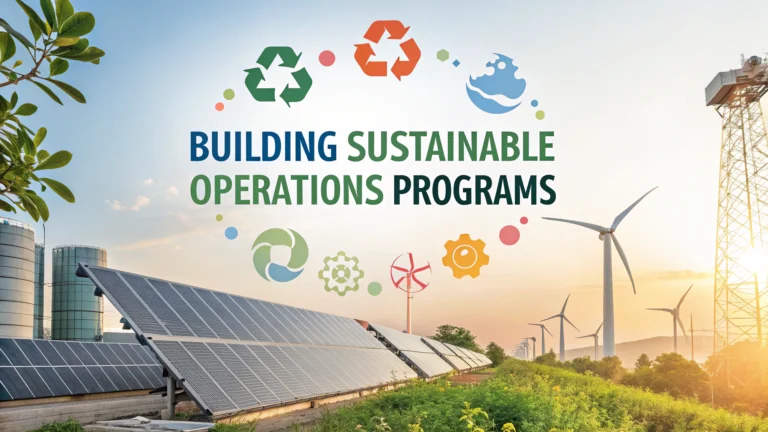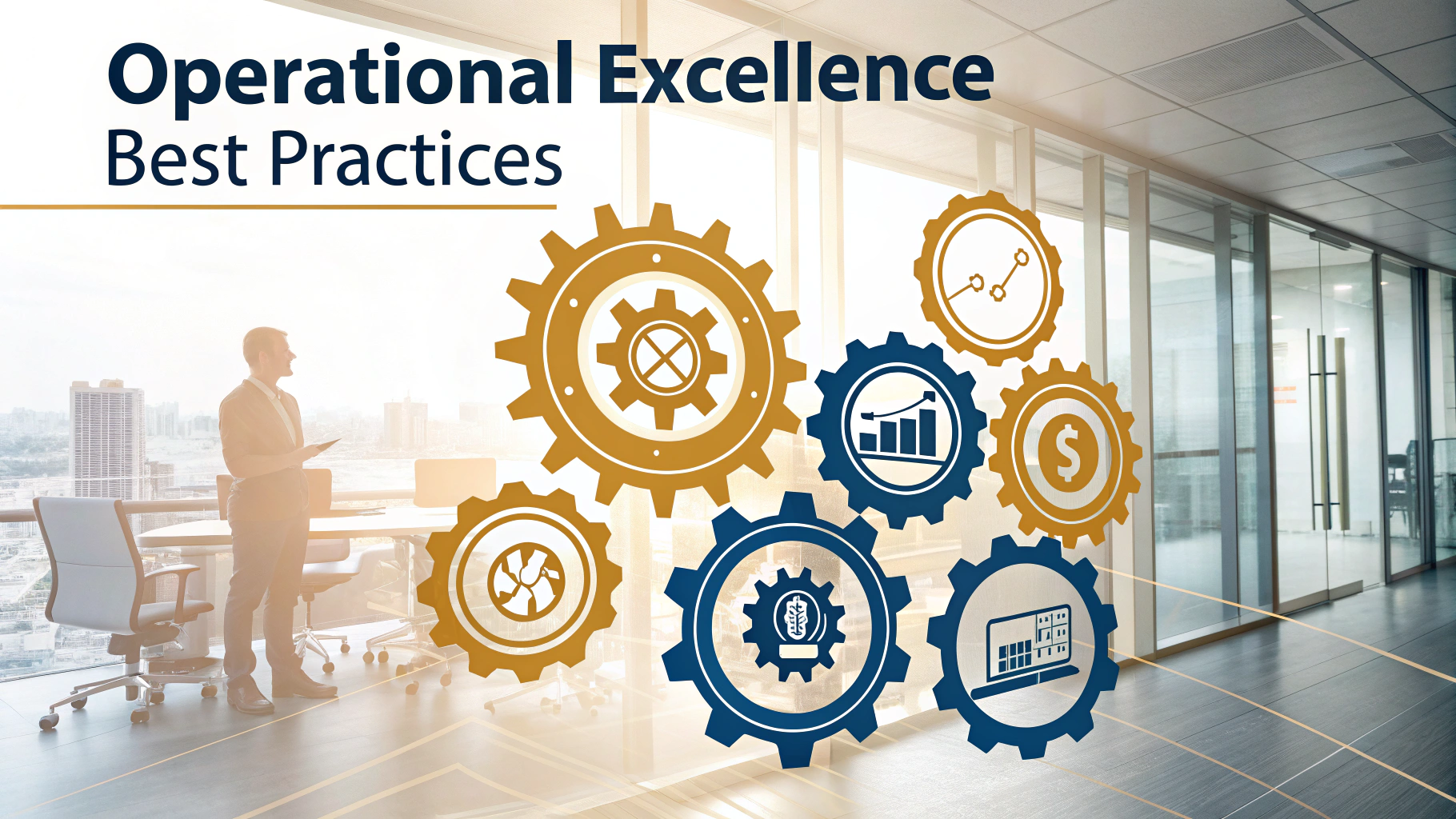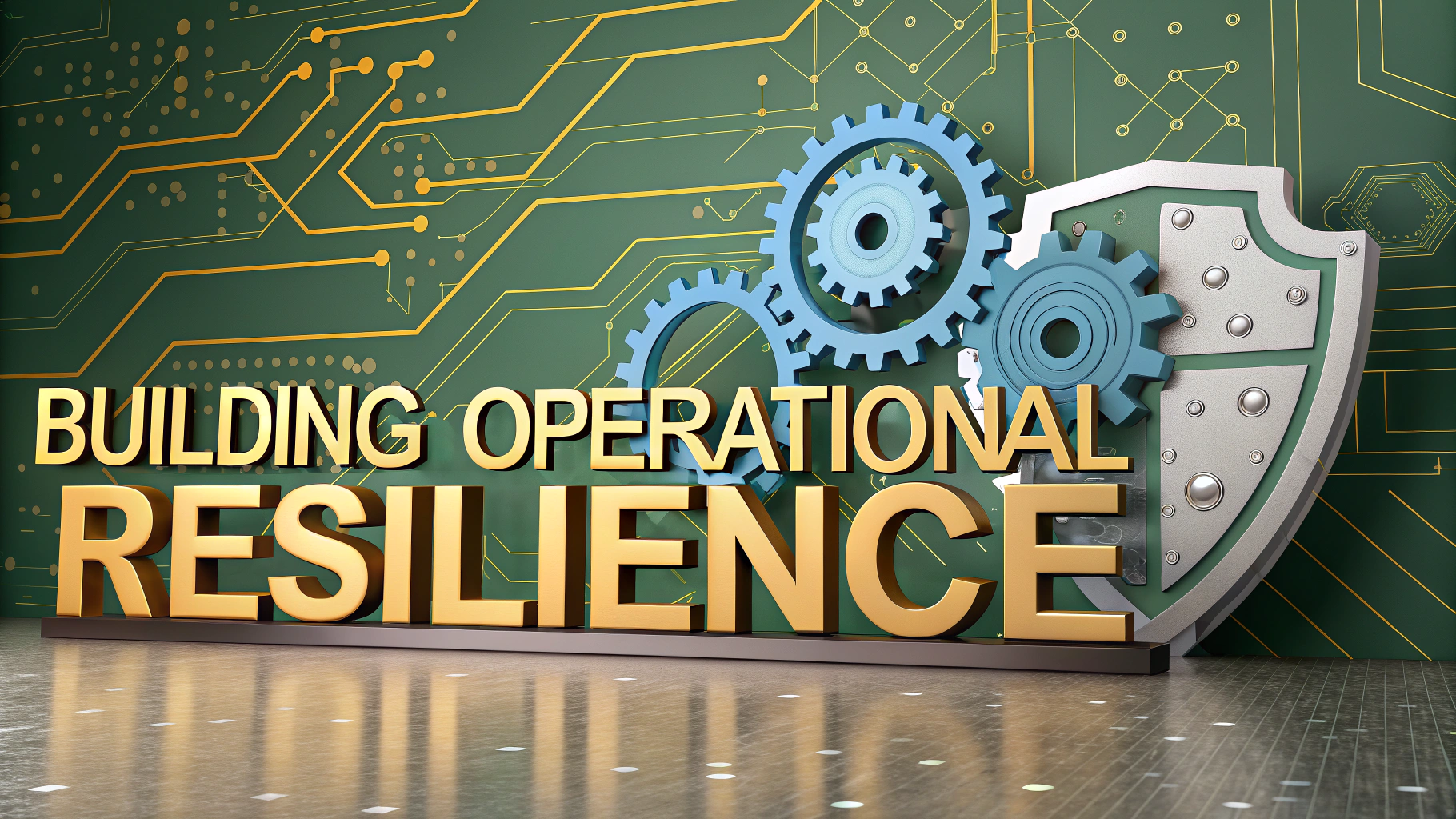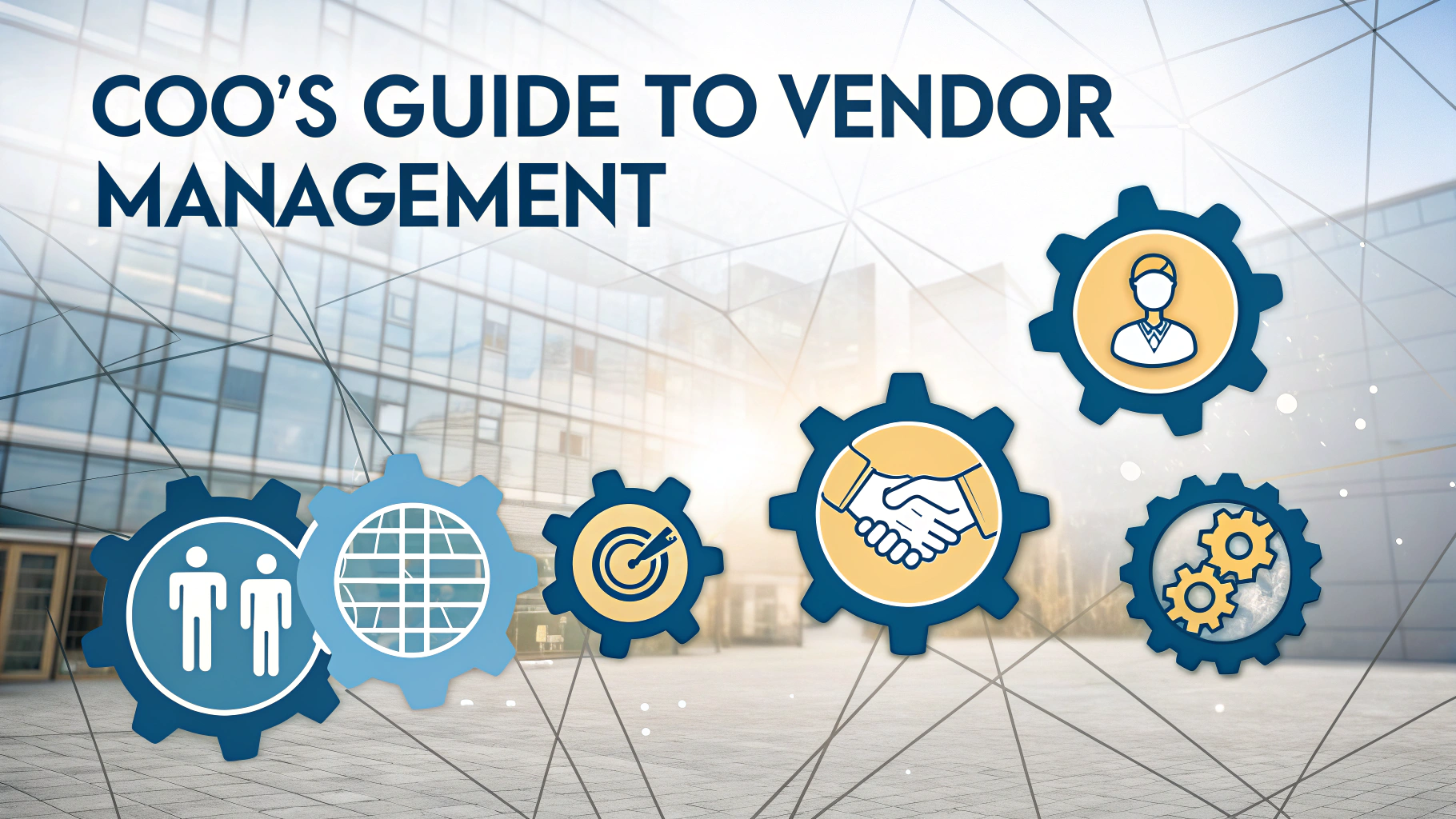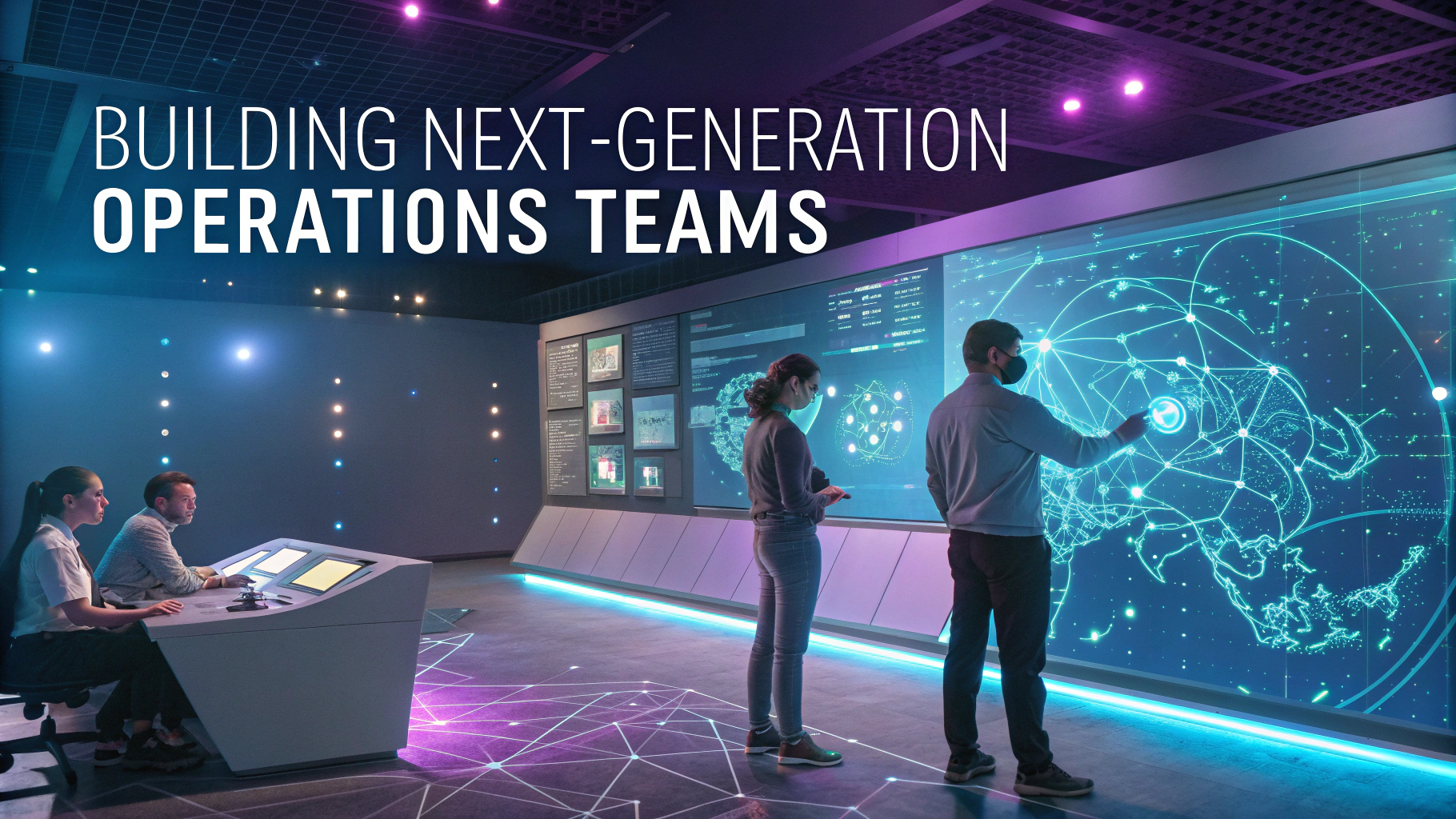Sustainable operations hold a central role in modern business success, combining environmental responsibility with operational efficiency and long-term profitability.
Building effective sustainable operations requires a systematic approach that aligns environmental goals with core business objectives while maintaining competitive advantages.
This guide explores practical strategies for implementing sustainable operations programs, focusing on actionable steps that chief operating officers can take to drive meaningful change.
Key Components of Sustainable Operations
- Energy efficiency initiatives
- Waste reduction programs
- Supply chain optimization
- Resource conservation
- Carbon footprint reduction
Setting Clear Sustainability Goals
Start by establishing specific, measurable sustainability targets aligned with your organization’s capabilities and industry standards.
Example Sustainability Metrics:
- Carbon emissions reduction (measured in tons)
- Energy usage reduction (kWh)
- Water conservation goals (gallons)
- Waste reduction targets (%)
Implementing Energy Efficiency Measures
Energy efficiency forms the foundation of sustainable operations, offering immediate cost savings and environmental benefits.
- Install LED lighting systems
- Upgrade to energy-efficient HVAC systems
- Implement smart building management systems
- Consider renewable energy sources
Supply Chain Sustainability
Transform your supply chain through these proven strategies:
- Partner with eco-conscious suppliers
- Optimize transportation routes
- Use sustainable packaging materials
- Implement reverse logistics programs
Employee Engagement Programs
Success in sustainable operations requires active participation from all employees.
- Provide sustainability training
- Create green teams
- Establish reward programs for sustainable initiatives
- Regular communication about sustainability goals and progress
Technology Integration for Sustainability
Leverage these technological solutions to enhance sustainable operations:
- IoT sensors for resource monitoring
- AI-powered energy management systems
- Digital waste tracking platforms
- Cloud-based sustainability reporting tools
Measuring and Reporting Progress
| Metric | Measurement Tool | Reporting Frequency |
|---|---|---|
| Energy Usage | Smart meters | Monthly |
| Waste Production | Waste audits | Quarterly |
| Carbon Emissions | Carbon calculators | Annually |
Financial Considerations
Consider these funding options for sustainable initiatives:
- Green bonds
- Environmental grants
- Energy efficiency tax incentives
- Sustainability-linked loans
Building Long-term Success
Create a culture of continuous improvement by regularly reviewing and updating sustainability programs based on performance data and emerging best practices.
Contact sustainability consulting firms like Environmental Resources Management or DNV for professional guidance in developing your sustainable operations program.
Regulatory Compliance and Standards
Maintain compliance with environmental regulations and industry standards to ensure sustainable operations meet legal requirements and best practices.
- ISO 14001 Environmental Management
- GRI Sustainability Reporting Standards
- Science-Based Targets initiative (SBTi)
- Regional environmental regulations
Risk Management Strategies
Implement comprehensive risk assessment and mitigation plans to protect sustainable operations:
- Climate change impact assessments
- Supply chain vulnerability analysis
- Resource scarcity planning
- Environmental incident response protocols
Innovation and Research Development
Invest in sustainable technologies and practices that drive operational excellence:
- Green technology research partnerships
- Circular economy initiatives
- Sustainable material development
- Process optimization studies
Stakeholder Communication
Develop transparent communication channels for sustainability initiatives:
- Annual sustainability reports
- Stakeholder engagement programs
- Community outreach initiatives
- Investor relations updates
Advancing Sustainable Business Leadership
Transform sustainable operations from a compliance requirement to a competitive advantage through consistent implementation, measurement, and adaptation of environmental initiatives. Establish your organization as an industry leader by integrating sustainability into every aspect of operations while maintaining profitability and growth.
Remember that sustainable operations require ongoing commitment, regular assessment, and continuous improvement to achieve lasting environmental and business benefits.
FAQs
- What are the key elements of a sustainable operations program?
A sustainable operations program includes energy efficiency initiatives, waste reduction strategies, sustainable supply chain management, green building practices, resource conservation measures, and employee engagement programs. - How do you measure the success of a sustainable operations program?
Success is measured through key performance indicators (KPIs) including carbon footprint reduction, energy consumption metrics, waste diversion rates, water usage reduction, cost savings, and ROI on sustainability initiatives. - What role does technology play in sustainable operations?
Technology enables smart building management systems, energy monitoring, automation of resource-efficient processes, data analytics for optimization, and IoT sensors for real-time tracking of environmental impacts. - How can companies ensure compliance with environmental regulations while building sustainable operations?
Companies should maintain updated environmental management systems, conduct regular audits, implement monitoring protocols, provide staff training, and engage with regulatory bodies to stay current with requirements. - What are the financial benefits of implementing sustainable operations programs?
Financial benefits include reduced utility costs, lower waste management expenses, tax incentives, improved operational efficiency, enhanced brand value, and increased access to sustainable financing options. - How can organizations engage employees in sustainable operations initiatives?
Organizations can implement training programs, create green teams, establish incentive systems, communicate success stories, provide sustainability education, and involve employees in decision-making processes. - What are the best practices for sustainable supply chain management?
Best practices include supplier sustainability assessments, local sourcing strategies, sustainable packaging requirements, transportation optimization, vendor code of conduct implementation, and regular sustainability performance reviews. - How can companies effectively manage waste reduction in sustainable operations?
Companies should implement recycling programs, adopt circular economy principles, conduct waste audits, establish composting systems, implement paperless initiatives, and partner with sustainable waste management providers. - What certifications should organizations pursue for sustainable operations?
Key certifications include LEED (Leadership in Energy and Environmental Design), ISO 14001, Energy Star certification, B Corp certification, and industry-specific sustainability certifications. - How do sustainable operations programs impact company reputation?
Sustainable operations enhance brand value, improve stakeholder relations, attract environmentally conscious customers, increase competitive advantage, and demonstrate corporate social responsibility commitment.
